The BBC could strengthen democratic participation by providing integrated and targeted information on elections
The license fee should and does pay for a ‘digital public space’, rather than just broadcast content. Richard Berry argues this is exactly the right approach for a public service broadcaster in the internet age, and outlines how the vision can be made a reality when it comes to the publication of election results.
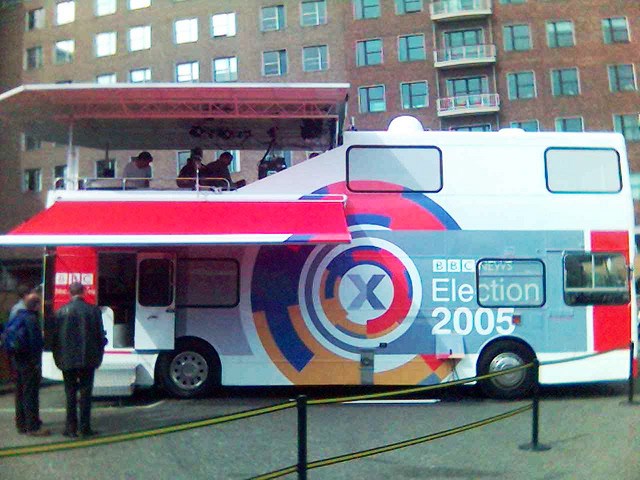
BBC Election Bus. Credit: Tristram Biggs CC BY-ND 2.0
David Dimbleby’s announcement of the BBC’s exit poll results, just after 10pm on 7 May 2015, is one of the abiding memories of this year’s general election campaign. For all the officialdom surrounding elections, it was the BBC that told us in a single instant who had won the election, sending a shockwave through the political system that didn’t abate until three party leaders had resigned (although one later changed his mind).
That was news, most definitely, and news will always be necessary. But in a digital age, citizens don’t just want news about their democracy from the BBC. They want information. Some of them even want data. It is in these areas that the BBC needs to, and can, enhance its elections output.
Tony Ageh, the BBC’s Controller of Archive Development, has said before onopenDemocracy that the license fee should and does pay for a ‘digital public space’, rather than just broadcast content. That is exactly the right approach for a public service broadcaster in the internet age. So how do we make that vision a reality for election results publication?
We must start with the recognition that future generations of BBC audiences – if ‘audience’ is a word that still applies – will consume information in different ways. This change is well underway. People who have grown up with the internet, and especially smartphone and tablet devices, expect information to be readily available, tailored to them, whenever or wherever they want. In many areas this is already the case, but in electoral information the UK is not even close to meeting that expectation.
Let’s look at a typical example of how the BBC publishes an election result. This is the page showing the result for the Denton & Reddish constituency at the 2015 general election:
This is, of course, a fairly clear and informative page. But there are several flaws. Most serious, it is not integrated with information for past elections, or other types of election. If a voter searches the BBC for the general election results in Denton and Reddish, from the same source they should be able to access information about elections for their local council, Police and Crime Commissioner, MEPs and in the future the Greater Manchester mayor. This would give them a very rich picture of the democratic process. It could be forward-looking, too, giving the dates of upcoming elections and links to further information. The change is not so radical: the BBC already holds all of this information, it just doesn’t organise it online with the individual voter in mind.
For local elections, there are distinct problems. Firstly, postcode search is not available (as it is for general elections). Voters who might be struggling to remember on which side of arbitrary local council boundaries they live on have no straightforward way to find the result relevant to them other than scrolling through the entire list of councils. For both local and national elections, the BBC could also add geo-location search, making the process even easier – this is already available on the BBC Weather webpages, incidentally.
In local elections we also see the phenomenon of the ‘No Overall Control’ council. This is a phrase that exists nowhere in the public lexicon except media reporting of local election results. See this results page for the 2014 local election in St Albans, where there was a clear winner – the Conservatives – who were not identified as such by the BBC:
For a sizeable chunk of the population who live in an area where there is no majority party on the council, the BBC neglects its duty to provide them with meaningful election results. Because every ‘No Overall Control’ council is still controlled by someone, be it a coalition or a minority administration. This is the actual outcome of the election that voters participated in, but this information is not included in the BBC’s output.
In fact, this practice gave a misleading picture of the national outcomes of the local elections in 2014. The BBC declared that No Overall Control had ‘won’ 31 councils. If, instead, it had recorded which party had won the most seats on these councils, the reporting would have been different. The chart below shows that Labour’s victory was not as significant as reported by the BBC, a fact which may have contributed to subsequent miscalculations about the closeness of the 2015 general election.
Both of the election results pages shown above – despite the fact they will be online for years to come – have all the hallmarks of being temporary. They report the news from election day. This will be of interest to voters in the following days and weeks, but their utility beyond this is limited. Imagine, instead, if the BBC were to produce a permanent information source about past and upcoming elections, regularly updated: this would almost certainly become a vital part of the Britain’s electoral infrastructure.
Is it the job of the BBC to upgrade the election information voters receive? Not solely, but it can be, as part of a network of other public organisations. This is one way in which the BBC can show it has a future role as an information service for the public well beyond its radio and television output, adding value to the state in ways that commercial broadcasters never would.
It’s worth pausing here to consider exactly who is responsible for publishing election results in Britain, and how they do it. The table below gives an overview of the BBC’s approach, alongside the other key public sources: the Electoral Commission, Parliament and local councils (devolved authorities also publish their own results too in varying degrees of detail). This also highlights the poor availability of open data: put simply, whether results are available to download in spreadsheet format.
There are other sources filling in a few of these gaps. The Guardian favours an open data approach, publishing spreadsheets with full results for some elections. Voluntary efforts like Boundary Assistant provide local election results in an engaging, user-friendly way. The Democratic Dashboard project at the London School of Economics is an attempt led by the political science research community to integrate election data for different types of election in one place. Unfortunately none has the remit or resources of the BBC.
In other countries, bodies equivalent to the Electoral Commission play a more active role in publishing results. In India and Bangladesh, national election commissions publish detailed results for multiple tiers of government; in India this information contributes to the monitoring of gender equality because it states whether candidates are male or female. In Australia, regional election commissions publish full results for local elections in their area. Although each is ahead of the UK, none has so far delivered the kind of integrated, public-focused election information that is required.
The opportunity for the BBC is not to unilaterally expand the resources it devotes to providing election information, but to seek new ways to work in partnership with other bodies. For instance, if the Electoral Commission or local councils do not have the technical capability to turn their election data into user-friendly applications, the BBC could. The common goal would be to enhance the way voters participate in democracy, and prove that the BBC is an essential organisation in delivering this.
—
Note: this post represents the views of the author and not those of Democratic Audit or the London School of Economics. It originally appeared on the openDemocracy OurBeeb blog.
—
 Richard Berry is a Research Associate at Democratic Audit. He is also a scrutiny manager for the London Assembly and runs the Health Election Data project at healthelections.uk. View his research at richardjberry.comor find him on Twitter @richard3berry.
Richard Berry is a Research Associate at Democratic Audit. He is also a scrutiny manager for the London Assembly and runs the Health Election Data project at healthelections.uk. View his research at richardjberry.comor find him on Twitter @richard3berry.

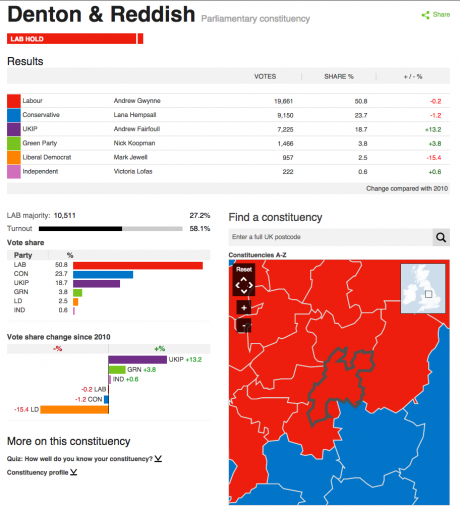
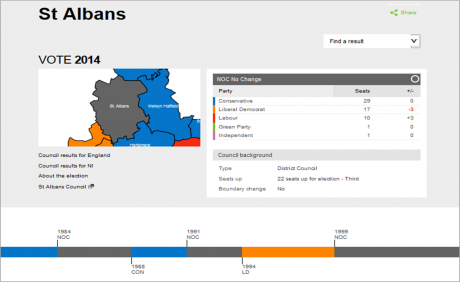
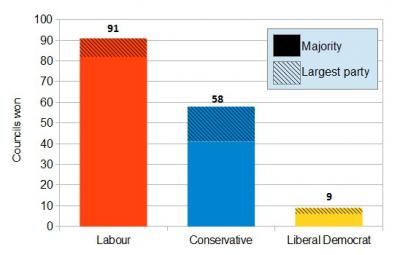
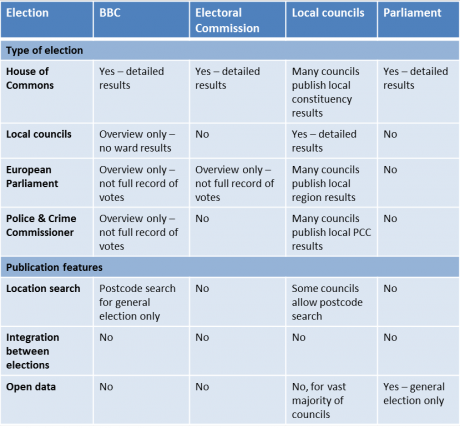




 Democratic Audit's core funding is provided by the Joseph Rowntree Charitable Trust. Additional funding is provided by the London School of Economics.
Democratic Audit's core funding is provided by the Joseph Rowntree Charitable Trust. Additional funding is provided by the London School of Economics.
The BBC could strengthen democratic participation by providing integrated and targeted information on elections https://t.co/vqDphsRmLU
NOC is a difficult one to safely communicate. In some councils NOC is a real state and no party does have control. This is true of 4th option councils who have proportional representation on all committees. Therefore it is a sticky situation in which to apply a ‘winner’ because this could mislead.
The elections centre at Plymouth University is providing a very useful online service to show a lot of the data you are discussing.
RT @democraticaudit: #BBC could strengthen democratic participation by providing integrated & targeted information on elections https://t.c…
The BBC could strengthen democratic participation, says @richard3berry
More here: https://t.co/CkPABj04zE @democtraticaudit
India & Bangladesh election commissions commended for publishing detailed results for multiple tiers of govt https://t.co/dmsrO3X1z4
The BBC could strengthen democratic participation by providing integrated and targeted information on elections https://t.co/hvhvpgjQAy
The BBC could strengthen democratic participation by providing integrated and targeted information on elections https://t.co/5cn3uCZGdP
BBC could strengthen democratic participation by providing integrated & targeted information on elections https://t.co/8Pnj0UVKw1 #opendata
The BBC could strengthen democratic participation by providing integrated and targeted information on elections https://t.co/Uv41IWtKEL
@BBCPolitics integrated info https://t.co/HcSvqF6Ly8 @democraticaudit @elecciones_2015 @LourdesPerez_DV @gara_isoto https://t.co/hlc8vA8vDb
.@Richard3Berry on great form here: https://t.co/FcQAQPWLDK – ironically his groundwork on the @DemocraticDash has helped reduce the need!
The BBC could strengthen democratic participation by providing integrated and targeted… https://t.co/wRgj0esDKl https://t.co/DItZsUoKdj